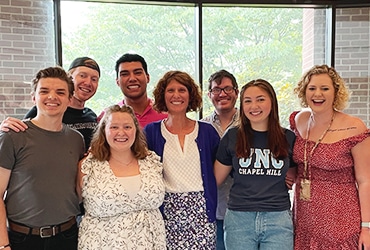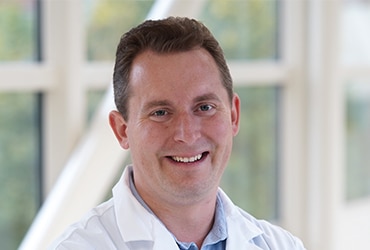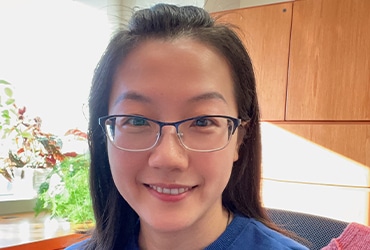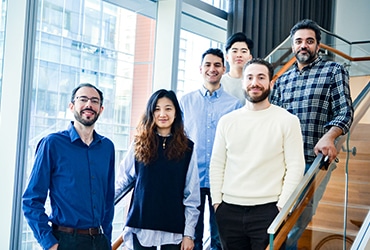Launching Independent Careers with the AACR-PanCAN Pathway to Leadership Grant
By Alice Bradbury, PhD
Dedicated to accelerating the conquest of cancer, the AACR is a unique organization committed to funding research projects across all cancer sites and researchers at all career levels. In partnership with the Pancreatic Cancer Action Network (PanCAN), a nationwide organization dedicated to pancreatic cancer, the AACR-PanCAN Pathway to Leadership Grant was established in 2010. Running until 2017, the joint program offered $600,000 over five years to facilitate the career transition of pancreatic cancer researchers from postdoctoral/clinical research fellow to independent faculty.
Intended to parallel the National Institutes of Health K99/R00 early-career investigator awards, the Pathway to Leadership Grant supported two years of mentored research followed by three years of independent research. Thirteen promising pancreatic cancer researchers were awarded the Pathway to Leadership Grant, representing the joint commitment of the AACR and PanCAN to grow the pancreatic cancer research community. Four of these grant recipients share the impact of this unique program on their careers and research.

“The Pathway to Leadership Grant provided funding for me to collect exciting preliminary data during the end of my postdoc, which formed the basis for my first R01 and what ended up being the first paper from my independent laboratory,” said Dr. Kirsten Bryant who found that dual inhibition of autophagy and ERK reduced pancreatic cancer proliferation and tumor growth during the mentored phase of her research – a treatment strategy now being investigated in multiple clinical trials. Transitioning from a postdoctoral research fellow to assistant professor at the University of North Carolina Medical School, Dr. Bryant’s lab now focuses on determining mechanisms by which the KRAS oncogene alters the metabolic activity, autophagy, in pancreatic cancer. Ongoing projects are focused on further advancing anti-autophagy inhibition strategies.
Dr. Bryant was on maternity leave with her first child when she was awarded the Pathway Leadership Grant in 2015, sharing, “It is well known that many women, particularly those with children, leave academia during the postdoc to faculty transition. This award provided me with secure funding to focus on the work that was most important to me, and a confidence boost that I could make it in academia.” She elaborated that “demonstrating a track record of successful grantsmanship is key to success in academia, and I believe that AACR-PanCAN’s early investment in my work significantly contributed to my ability to quickly secure funding for my independent laboratory.”
Dr. Ethan Abel received the Pathway to Leadership Grant in 2016 whilst a postdoctoral research fellow at the University of Michigan. During the mentored phase of his research, Dr. Abel studied how a novel cancer-driving protein HNF1A promotes key features of pancreatic cancer. He said, “The biggest impact of the AACR-PanCAN Pathway to Leadership Grant was by far the opportunity it gave me to start my own research lab. Without this award it would have been unlikely that I would have been able to make the transition from a postdoctoral fellow to an independent researcher, and as such, I would likely not be able to continue doing pancreatic cancer research in the long-term.”

Launching his independent laboratory as an assistant professor of oncology at the Roswell Park Cancer Center, Dr. Abel is now investigating the interplay between HNF1A and protein KRAS, and how HNF1A may be targeted in pancreatic cancer through the use of BET inhibitors. As well as supporting this proposed research, Dr. Abel stated that the Pathway to Leadership Grant has also funded “new research objectives that are allowing my research team to understand multiple aspects of pancreatic cancer biology and potentially uncover novel modalities to treat the disease.”
Wantong Yao, MD, PhD received the Pathway to Leadership Grant in 2016. She explored the surface protein repertoire specifically regulated by KRAS, the most dominant oncogene which drives the majority of pancreatic cancers, and uncovered Syndecan1. Furthermore, she was able to elucidate the mechanism by which KRAS regulates Syndecan1 and how deregulation of this pathway affects pancreatic cancer maintenance and progression. Transitioning from a postdoctoral research associate to assistant professor at MD Anderson Cancer Center, Dr. Yao said, “I am particularly interested in the regulation and function of cell surface proteins in pancreatic cancer. My goal is to explore the potential of tumor-specific surface proteins as diagnostic biomarkers or therapeutic targets.”

“I deeply appreciate the support from the Pathway to Leadership Grant for allowing me to pursue my proposed pancreatic cancer research,” stated Dr. Yao. She expanded, “At the critical early stage of my career, receiving this prestigious grant was instrumental for me to achieve my career goal because it provided not only the important funding to jump start my research program, but also the recognition which helped me to step into my independent career.”
Rohit Chandwani, MD, PhD also received the Pathway to Leadership Grant in 2016 whilst a surgical oncology fellow at the Memorial Sloan Kettering Cancer Center. He launched his independent laboratory as an assistant professor of surgery and cell and developmental biology at Weill Cornell Medicine in 2017, sharing, “In addition to providing support for my salary during dedicated research time after fellowship, receiving the Pathway to Leadership grant gave me credibility in the field, fostered new scientific relationships, and provided support for experimentation and personnel during the first few years of running an independent laboratory. In short, the grant was invaluable to every aspect of my current roles as a surgeon-scientist at Weill Cornell Medicine.”

“Without this support, I can safely say I would probably not have developed this passion and commitment to pancreatic cancer research and patient care,” said Dr. Chandwani, whose laboratory investigates the epigenetic reprogramming of normal cells leading to pancreatic cancer development and progression. He elaborated, “Receipt of the Pathway to Leadership Grant ignited what was previously just a nascent interest and has grown to become the focus of my research, clinical efforts, and mentoring and teaching of future clinicians and scientists.”
As well as financial support, the Pathway to Leadership Grant offered grant recipients career development opportunities including mentorship and the opportunity for collaboration through invitations to AACR and PanCAN meetings. “These meetings have shaped my understanding of pancreatic cancer, and to this day, continue to open doors for me. PanCAN has cultivated a collaborative family of pancreatic cancer researchers and I am grateful to be a part of this community,” Dr. Bryant reflected. Whilst Dr. Yao added that the opportunity for scientific interaction with the AACR and PanCAN communities provided by this grant were “crucial for my career development.”
With the support of the AACR-PanCAN Pathway to Leadership Grant, all thirteen grant recipients successfully obtained their first independent faculty position. Furthermore, the financial support proffered by the AACR-PanCAN Pathway to Leadership Grant resulted in a further $11 million of grant support for pancreatic cancer research, 51 peer-reviewed publications, and 150 poster and oral presentations at scientific meetings and seminars.